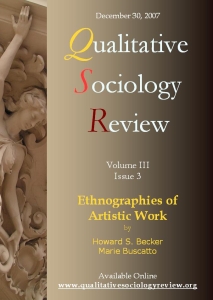The Centripetal Force of Expression: Drawing Embodied Histories into Glassblowing
DOI:
https://doi.org/10.18778/1733-8077.3.3.08Keywords:
Embodiment, Expression, Practical knowledge, Art, Glassblowing, Epistemology, Ethnography, Phenomenology, Materiality, InnovationAbstract
Getting at the tacit understandings of an artful practice is critical in coming to understand the processes of creativity. To achieve this, the researcher, specifically the ethnographer, must place herself in the position of the maker, that is she must herself, make and create. This article provides an account of arriving at the methodological imperative of in situ ethnographic research through actual ethnographic research on the relation of maker and material. From an in situ position, it theorizes the modalities of expression in practice, from problem-solving, to personal style, to the intentional drawing in of embodied histories in practice. This incorporation of varying embodied histories into a current practice is then explored as the possibility for affecting what is recognized in the field as ”new” or ”innovative”. We will see, however, that is affect is grounded more in the corporeal revealing of unexpected aspects of the material worked up.
Downloads
References
Aristotle (1999) Nicomachean Ethics. Translated by Martin Ostwald. New Jersey: Prentice Hall.
Google Scholar
DOI: https://doi.org/10.1093/oseo/instance.00258595
Bachelard, Gaston (1971) On Poetic Imagination and Reverie. Woodstock, Connecticut: Spring Publications.
Google Scholar
Bourdieu, Pierre (1990) The Logic of Practice. Translated by Richard Nice. Cambridge, England: Polity Press.
Google Scholar
Bourdieu, Pierre (2000) Pascalian Meditations. Translated by Richard Nice. Stanford, California: Stanford University Press.
Google Scholar
Byrd, Joan Falconer (2001) “Interview with Harvey Littleton.” Smithsonian Archives of American Art. Spruce Pine, North Carolina, 15 March 2001.
Google Scholar
Heidegger, Martin (1996) Being and Time. Translated by Joan Stambaugh. New York: State University of New York.
Google Scholar
Leder, Drew (1990) The Absent Body. Chicago: University of Chicago.
Google Scholar
Levi-Strauss, Claude (1963) Totemism. Boston: Beacon Press.
Google Scholar
Merleau-Ponty, Maurice (1962) The Phenomenology of Perception. London: Routledge.
Google Scholar
O'Connor, Erin (2005) "Embodied Knowledge: Meaning and the Struggle Towards Proficiency in Glassblowing." Ethnography 6(2): 183-204.
Google Scholar
DOI: https://doi.org/10.1177/1466138105057551
O'Connor, Erin (2006) "Glassblowing Tools: Extending the Body Towards Practical Knowledge and Informing a Social World." Qualitative Sociology 29 (2): 177-193.
Google Scholar
DOI: https://doi.org/10.1007/s11133-006-9013-1
Plato (1981) "Meno" in Five Dialogues. Translated by G.M.A. Grube. Indianapolis, Cambridge: Hackett Publishing Company.
Google Scholar
Polanyi, Michael (1962) Personal Knowledge: Towards a Post-Critical Philosophy. Chicago: University of Chicago Press.
Google Scholar
Polanyi, Michael (1967) The Tacit Dimension. Garden City & New York: Anchor Books.
Google Scholar
Downloads
Published
How to Cite
Issue
Section
License

This work is licensed under a Creative Commons Attribution-NonCommercial-NoDerivatives 4.0 International License.











